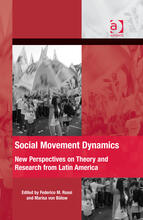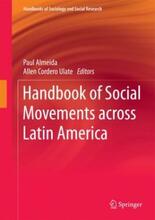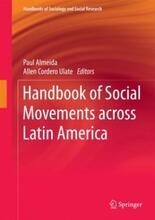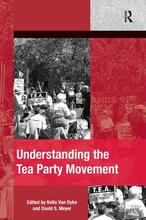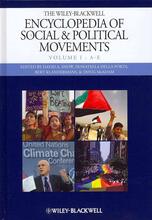Publications
2015
This handbook covers social movement activities in Latin American countries that have had profound consequences on the political culture of the region. It examines the developments of the past twenty years, such as a renewed upswing in popular mobilization, the ending of violent conflicts and military governments, new struggles and a relatively more democratic climate. It shows that, from southern Chiapas to Argentina, social movements in the 1990s and especially in the 2000s, have reached new heights of popular participation. There is a lack of research on the politics of this region in the contemporary era of globalization, this volume partially fills the void and offers a rich resource to students, scholars and the general public in terms of understanding the politics of mass mobilization in the early twenty-first century. The contributors each address social movement activity in their own nation and together they present a multidisciplinary perspective on the topic. Each chapter uses a case study design to bring out the most prominent attributes of the particular social struggle(s), for instance the main protagonists in the campaigns, the grievances of the population and the outcomes of the struggles. This Handbook is divided into seven substantive themes, providing overall coherence to a broad range of social conflicts across countries, issues and social groups. These themes include: 1) theory of Latin American social movements; 2) neoliberalism; 3) indigenous struggles; 4) women’s movements; 5) movements and the State; 6) environmental movements; and 7) transnational mobilizations.
2014
Paul Almeida’s comparative study of the largest social movement campaigns that existed between 1980 and 2013 in every Central American country (Costa Rica, El Salvador, Guatemala, Honduras, Nicaragua, and Panama) provides a granular examination of the forces that spark mass mobilizations against state economic policy, whether those factors are electricity rate hikes or water and health care privatization. Many scholars have explained connections between global economic changes and local economic conditions, but most of the research has remained at the macro level. Mobilizing Democracy contributes to our knowledge about the protest groups "on the ground" and what makes some localities successful at mobilizing and others less successful. His work enhances our understanding of what ingredients contribute to effective protest movements as well as how multiple protagonists—labor unions, students, teachers, indigenous groups, nongovernmental organizations, women’s groups, environmental organizations, and oppositional political parties—coalesce to make protest more likely to win major concessions.Based on extensive field research, archival data of thousands of protest events, and interviews with dozens of Central American activists, Mobilizing Democracy brings the international consequences of privatization, trade liberalization, and welfare-state downsizing in the global South into focus and shows how persistent activism and network building are reactivated in these social movements. Almeida enables our comprehension of global and local politics and policy by answering the question, "If all politics is local, then how do the politics of globalization manifest themselves?" Detailed graphs and maps provide a synthesis of the quantitative and qualitative data in this important study. Written in clear, accessible prose, this book will be invaluable for students and scholars in the fields of political science, social movements, anthropology, Latin American studies, and labor studies.
2013
This chapter analyzes the three largest insurgencies with majority Indigenous participation in Mesoamerica in the twentieth century and the ensuing trajectories of native peoples’ movements in these uprisings’ aftermath. It reviews the 1932 peasant uprising in El Salvador, the Guatemalan insurgency from the 1970s to the 1990s, and the 1994 Chiapas rebellion in southern Mexico and the subsequent movement it generated. The essay examines why Indigenous peoples engaged at times in radical and revolutionary tactics in collective action efforts to defend their rights, while in the contemporary period we observe less violent and confrontational agendas and strategies. Furthermore, the chapter analyzes political opportunities and various forms of threat (including state repression) so as to understand the divergent framing of Indigenous demands and forms of struggle over time and across cases. The state’s actions are a crucial dimension in defining what type of strategies these movements are likely to employ.
2012
Using a unique dataset on the geographic distribution of reported protest events from local sources, the study explains the variation in community-level mobilization in response to neoliberal reforms in two countries in the global periphery. Building on insights from macro, cross-national studies of protests related to market reforms, this article highlights local structural conditions that more likely generate popular contention in poorer countries. Count regression models show that localities with greater levels of state and community infrastructure (highways, administrative offices, universities, NGOs and local chapters of oppositional parties) were associated with heightened collective action opposing the privatization of health care and public utilities. These state and community infrastructures were shaped by national contexts in the era of state-led development preceding the current epoch of accelerated globalization.

